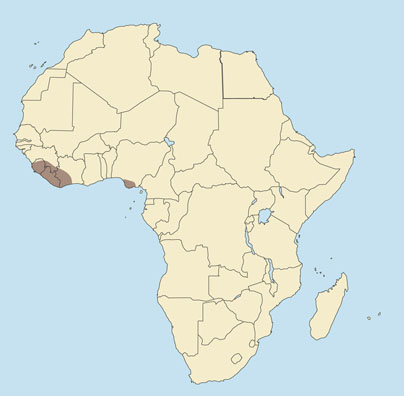 |
Hexaprotodon liberiensis
Hipopotamo enano (Sp), Zwergflusspferd (G), Hippopotame pygmée, Hippopotame nain (F).
DESCRIPTION Shoulder height 30-32 inches (76-81 cm). Weight 550-600 pounds (250-270 kg).
The pygmy hippopotamus is much smaller and more lightly built than the common hippo. It has proportionately longer legs, a relatively smaller and rounder head and large, nearly circular nostrils. The teeth are smaller, the lower canines do not develop into tusks, and there is only one pair of lower incisors (common hippo has 2-3 pairs). Reflecting its largely terrestrial environment, the eyes are on the side of the head and do not protrude. The toes are well separated and have sharp nails. The skin color is greenish black above, with gray sides and lighter underparts. Females are similar to males and roughly the same size.
BEHAVIOR Solitary except when mating. Breeds at the beginning of the dry season, bearing a single calf after 6-7 months gestation. Sexually mature at 3-5 years. Females give birth every two years. Longevity as much as 38 years in captivity.
Less aquatic than the common hippopotamus, spending much of its time on land. Nocturnal and secretive, sleeping by day and wandering in the forest at night, feeding on such vegetation as leaves, shoots, grasses and fallen fruit. Digs roots and tubers. Hearing and sense of smell are good, eyesight not as good. Can be dangerous when disturbed. Does well in captivity.
HABITAT Swampy rain forests, especially along streams.
DISTRIBUTION West Africa, in rain forest areas of Sierra Leone, southeastern Guinea, Liberia, and southwestern Ivory Coast. In addition, very small numbers may still exist in the Niger River delta in Nigeria, and perhaps elsewhere in that country.
REMARKS The pygmy hippopotamus is the national symbol of Liberia, and seems always to have been rare. It is a very wary, alert animal that has proven extremely difficult to hunt by normal methods. A few local Liberian hunters have been able to track them to their resting places in the thick jungle, but visiting sportsmen should not count on doing the same. Most are taken in pit traps dug in their pathways by local meat hunters; this also is a difficult matter, with only a handful of expert trappers having much success. Visitors to Liberia should be sure to visit the zoo in Monrovia, as this will afford the only look at a pygmy hippo they are likely to have.
TAXONOMIC NOTES Two subspecies: heslopi (Nigeria) and liberiensis (the rest of the species range). They can be distinguished by their skull characteristics. We do not separate them.
|





